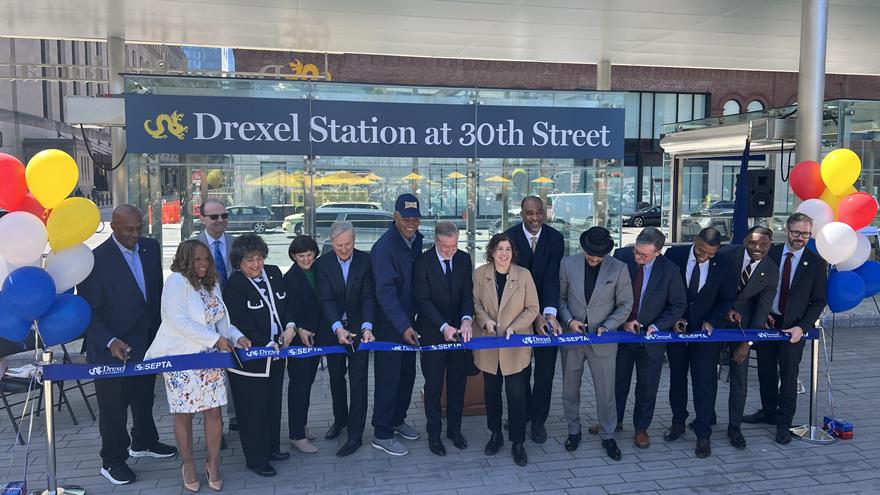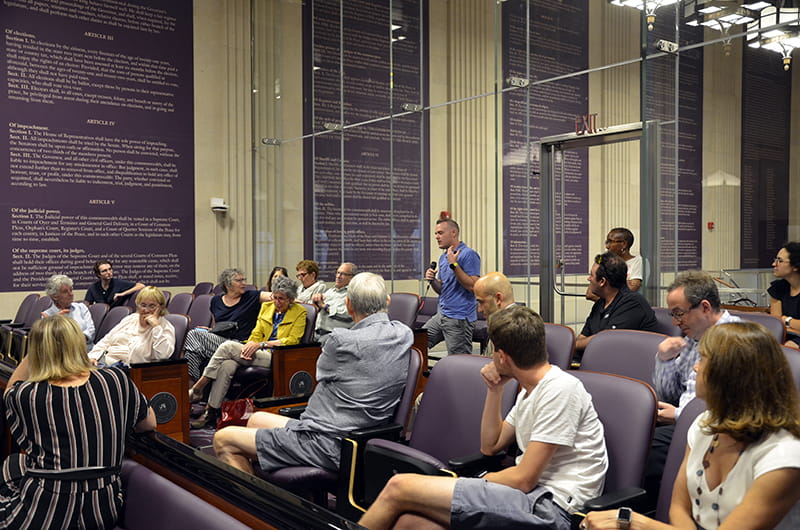Wednesdays at Kline Bring Civil Discourse to Drexel, Philadelphia Communities

- Ribbon-Cutting Ceremony Marks Official Unveiling of Drexel Station at 30th Street
- Partnerships and Projects: Drexel's Recent Industry and Civic Engagement Connections
- Express Your Thoughts About Climate Change in the Anthems for the Anthropocene Contest
- 40 Years Ago, Drexel Made Computer — and Apple — History

Promoting civil discourse within the local community seems an apt goal for an institution aimed at being the most civically engaged university in the U.S. In this vein, two Drexel University institutions have come together to do just that — not just sporadically, but on a weekly basis.
The Pennoni Honors College, in partnership with the Thomas R. Kline School of Law, piloted Wednesdays at the Kline on two occasions over the summer, and they are now hosted weekly at the Kline Institute of Trial Advocacy in Center City in order for members of the Philadelphia community to gather, listen and exchange ideas and perspectives regarding current events and issues.
Past topics discussed through Wednesdays at Kline have included immigration, the Mueller report and, most recently, the impeachment process. Melinda Lewis, PhD, the associate director of marketing and media for the Pennoni Honors College who moderates the discussions, said she and the Pennoni team try to be as topical as possible with what is discussed at each session, and they also disseminate suggested readings on the issues in advance to help guide conversation.
“I sit and I read the news every day for a week, and then a story typically comes out that seems to be the most significant or the most talked about, or seems like it could be a topic that we could expand outward,” she said.
This planning helps Lewis cater the discussion to the broad group of people who have already been attending the Wednesday events, as they vary in background, profession and age — and that group has continued to grow with each session.
“There’s a hunger for this. There’s an excitement,” Lewis said. “People really want to have conversations with a community and find that community of like-minded people, not necessarily in the sense of politics, but like-minded in wanting to talk, wanting to engage with this and wrestle with this material.”
“There’s a hunger for this. There’s an excitement,” Lewis said. “People really want to have conversations with a community and find that community of like-minded people, not necessarily in the sense of politics, but like-minded in wanting to talk, wanting to engage with this and wrestle with this material.”
“It seemed to me like it would be a great way to engage communities of people in conversations where they had a big stake, so that it was something people would be thinking about and it would be motivating to them to want to have conversation,” Filler said.
To find these community members ready and eager to engage in meaningful discourse, Pennoni staff and students took to the streets, handing out flyers in residential buildings in Center City, plus alerting the Drexel community. Though the political lean of attendees overall has until now been liberal, organizers are hoping to draw more of a spectrum of opinions in that regard in the future.
“Anyone is welcome. Any and all views are welcome,” said Erica Zelinger, director of marketing and media for Pennoni. “I think Melinda does a good job setting up that people from all walks of life can come and share their views. As long as there’s no punching or hitting, we can have civil discourse.”
Eileen Harrison, BS ’60 and a resident of South Philadelphia, started coming to Wednesdays at Kline discussions after the first one as she liked the idea of coming together in a forum situation to discuss the issues of the day.
“I’m very much committed to the idea of people coming together and working out problems as a group. I think there’s great merit in that,” she said. “We are in a time now when we live in a bubble and it’s hard to understand why people feel the way they do.”
Harrison added that she would like to see a more diverse group attending these events, especially more diverse in age and background. Lewis said she knows it may be hard for undergraduate students to make the journey into Center City, but those who do will find a good opportunity to exercise their civic-mindedness and learn about how other people experience the world in an environment that is low-pressure.
“[They can hear from] people who have already kind of negotiated these political spaces, who remember Nixon resigning, versus people who are experiencing these issues maybe for the first time,” Lewis said. “I think it’s a good playground for developing yourself as a civically minded individual, which I think is just part of Drexel’s initiative and I think we’re at a place where students are really interested in exploring themselves in that way.”
“I think something that we strive to do here in the Honors College is to promote Philadelphia as the classroom,” added Zelinger. “I think this gives a chance for students to go and have these discussions in a Center City environment that they’re not used to with unique individuals that they don’t know. So, it feels different than their average classroom setting here on campus.”
For law students who choose to attend, Filler said there is the added bonus of seeing how these types of conversations can be a part of creating law, part of the “construction of democracy” witnessed in real time.
“Courses are often not as immediate or contemporary as the debates that are happening in the news because they’re teaching much larger stories of law that aren’t necessarily about the immediate moment,” Filler said. “So, I love having our students engaged in these debates moment-to-moment. … I think that being an effective lawyer is being an engaged citizen.”
All in all, organizers agree that there needs to be more outlets for civil discourse like this, and Drexel has a great opportunity and civic responsibility to create them.
“These are conversations that people want to have, but are unable to find the space for those conversations,” Lewis said. “I think part of our rationale is that we should be the place where these conversations are happening. We should expand outside of Drexel’s physical space and go into the community and provide a site.”
“I think from the point of view of the community and society at large, we’re having a lot of difficulty having real serious conversations where there are divergent views,” Filler added. “I think we need to create opportunities for that, and I think Universities are natural places for that because I think there’s an understanding that in universities, we debate questions that are complicated and disputed.”
Wednesdays at Kline take place every Wednesday from 5:30–6:30 p.m. in the Kline Institute of Trial Advocacy. Click here for more information and to RSVP.
Drexel News is produced by
University Marketing and Communications.
